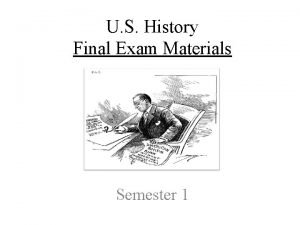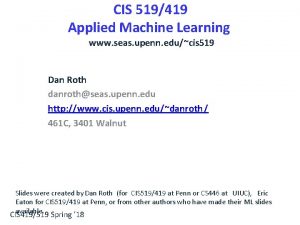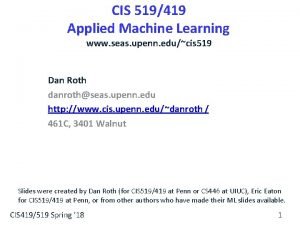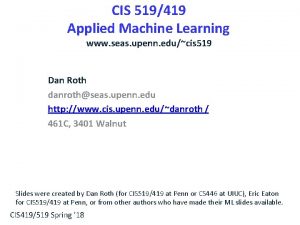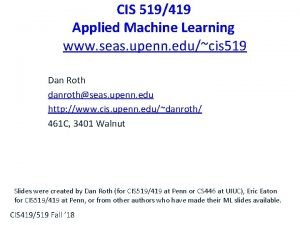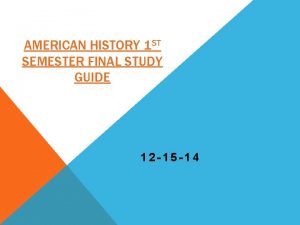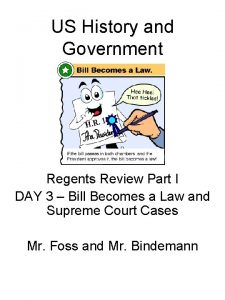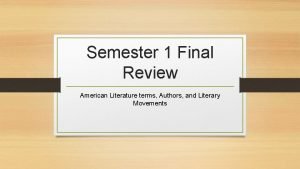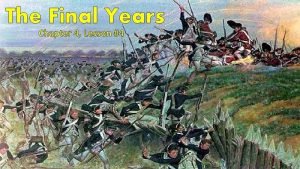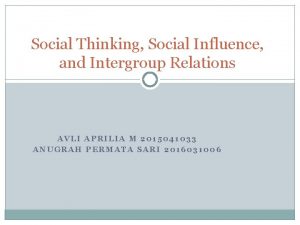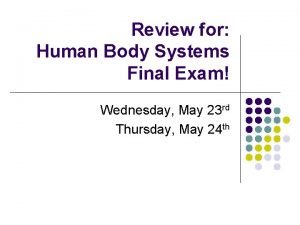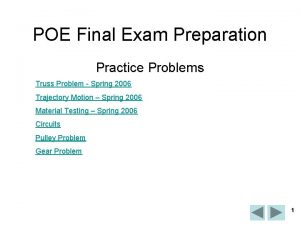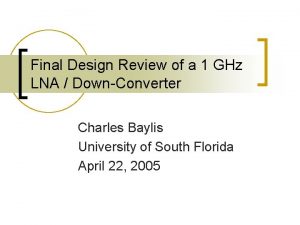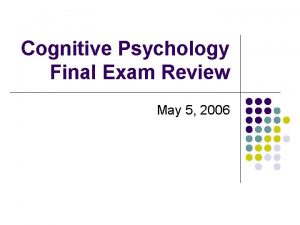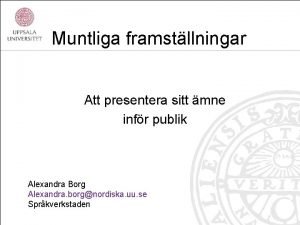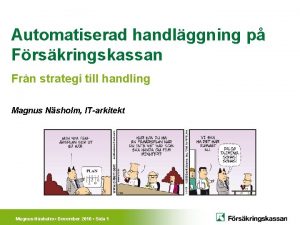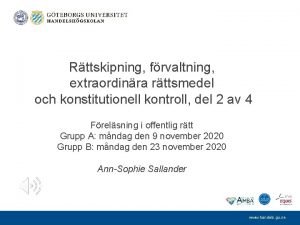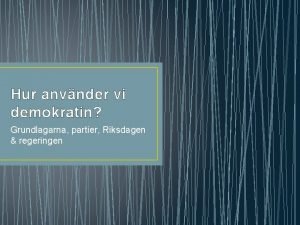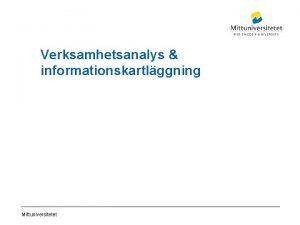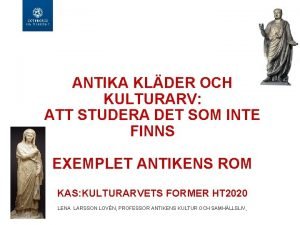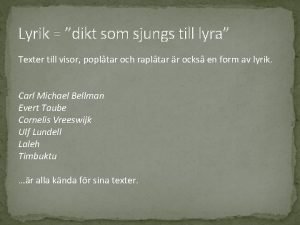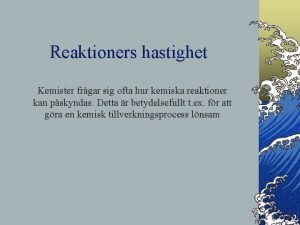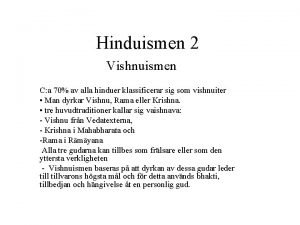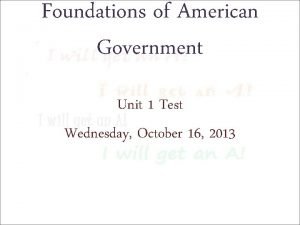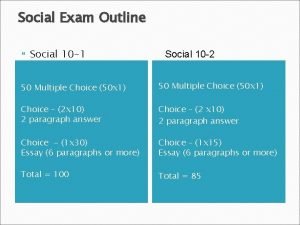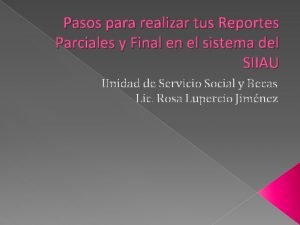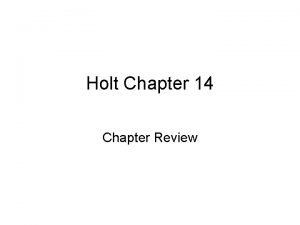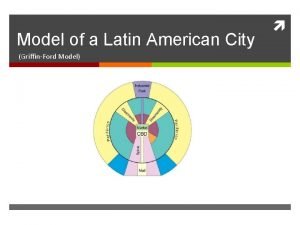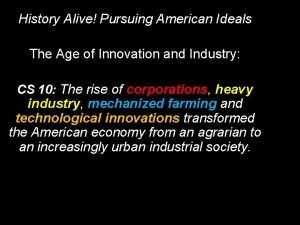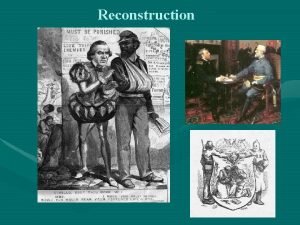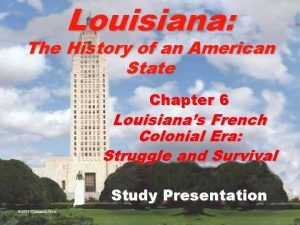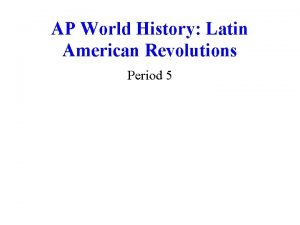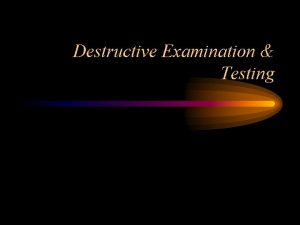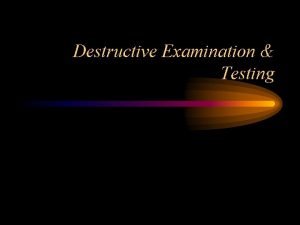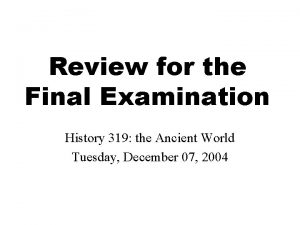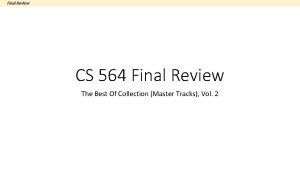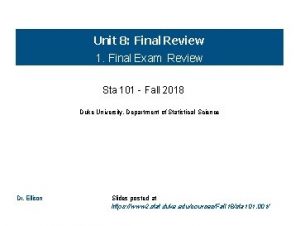Review for Final Examination History 419 American Social








































































![Conclusion: • [A] national effort towards the problems of Negro Americans must be directed Conclusion: • [A] national effort towards the problems of Negro Americans must be directed](https://slidetodoc.com/presentation_image_h2/e94e56c763b699a328a7d0868d6cb2bd/image-73.jpg)

































































![BACKLASH IN IRAN: On 24 June 2005 Mahmoud Ahmadi Nejad [mah-MOOD ah-mah-dih-nee-ZHAHD ] was BACKLASH IN IRAN: On 24 June 2005 Mahmoud Ahmadi Nejad [mah-MOOD ah-mah-dih-nee-ZHAHD ] was](https://slidetodoc.com/presentation_image_h2/e94e56c763b699a328a7d0868d6cb2bd/image-139.jpg)
- Slides: 139

Review for Final Examination History 419: American Social and Intellectual History Examination Date: December 10, 2007

Financing Relief Efforts (1931) Herbert Hoover

Herbert Hoover • • • • Born: August 10, 1874 in West Branch, Iowa Son of a Quaker blacksmith Grew up in Oregon Went to Stanford University in 1891 and graduated as a mining engineer Married Lou Henry Worked for a private corporation in China as a lead engineer Him and his wife were caught in the Boxer Rebellion in China in 1900 for almost a month; Herbert helped build barricades for the village while his wife helped at the hospital Helped return 120, 000 stranded tourists back the U. S. from London after Germany declared war on France He then proceeded to help feed Belgium which was overrun by the German Army President Wilson appointed Hoover head of the Food Administration at the beginning of WWI He was a member of the Supreme Economic Council and head of the American Relief Administration by the time the Armistice was signed He organized shipments of food for starving people in Europe and even in Soviet Russia in 1921 Served as Secretary of Commerce under Presidents Harding and Coolidge Served as the 31 st President from 1929 -1933 Always known as the scapegoat for the depression Died: October 20, 1964 in New York, New York

1. Americans should use self-help and charity to get through troubled times. • “It is a question as to whether the American people will maintain the spirit of charity and mutual self-help through voluntary giving…in times of national difficulty”. • “The basis of successful relief in national distress is to mobilize and organize the infinite number of agencies of self-help in the community”. • “There is no such paralysis in the United States, and I am confident that our people have the resources, the initiative, the courage, the stamina and kindliness of spirit to meet this situation in the way they have met their problems over generations”.

2. If the government gives appropriations, then the people will rely on appropriations in the future. • “Once this happened it is not the cost of a few score millions, but we are faced with the abyss of reliance in future upon Government charity in some form or other”. • “The people support the Government, the Government should not support the people” President Grover Cleveland, 1887

3. “Federal aid…weakens the sturdiness of our national character” – President Grover Cleveland, 1887 • “If we start appropriations of this character we have not only impaired something infinitely valuable in the life of the American people but have struck at the roots of self-government. The money involved is indeed the least of the costs to American ideals and American institutions”.

4. No one is going hungry or cold. • • • “I convoked a meeting of the Governors, the Red Cross and the railways, the bankers and other agencies in the country and laid the foundations of organization and the resources to stimulate every degree of self-help to meet the situation”. “The Red Cross officials, whose long, devoted service and experience is unchallenged, inform me this morning that, except for the minor incidents of any emergency organization, no one is going hungry and no one need go hungry or cold”. “But beyond this to assure that there shall be no suffering, in every town and county voluntary agencies in relief of distress have been strengthened and created and generous funds have been placed at their disposal”.

5. The local and state governments need to use all their resources before the federal government will step in to help. • “Our American system requires that municipal, county, and State governments shall use their own resources and credit before seeking such assistance from the Federal Treasury”.

Impact on Society • This document had a huge impact on all Americans at the time it was written. This document told the Americans that they would not get any help from the government for the depression, drought, and unemployment and that they would have to fend for themselves in this great time of need. • This document also made a great argument against Hoover for FDR in the following presidential election.

Questions • What would happen if charities did not respond to the crisis? • Why does Hoover feel that the expenditure of public moneys would have a negative impact on Americans? • Do you think Hoover would have felt the same way if he personally volunteered in those distressed communities?

Socialist Party Platform (1932) Norman Mattoon Thomas

Socialist Party, Socialist Party Platform, (1932) Main Points: 1. The unbalanced nature of the capitalist system produces unemployment and poverty. -Under capitalism the few own our industries. The many do the work. The wage earners and farmers are compelled to give a large part of the product of their labor to the few. The many in the factories, mines, shops, offices, and on the farms obtain but a scanty income and are able to buy back only a part of the goods that can be produced in such abundance by our mass industries. . . 2. The Socialist Party believes that workers are exploited by a capitalist economy. -The Socialist Party is to-day the one democratic party of the workers whose program would remove the causes of class struggles, class antagonisms, and social evils inherent in the capitalist system. It proposes to transfer the principal industries of the country from private ownership. . . to social ownership and democratic control. 3. Socialist Party's propositions to benefit workers. . The 6 -hour day and the 5 -day week without a reduction of wages. . . Health and maternity insurance. . Improved systems of workmen's compensation and accident insurance. . Adequate minimum wage laws. . . the rights of workers to organize into unions. . .

Socialist Party, Socialist Party Platform, (1932) 4. Socialist Party's propositions to benefit the unemployed. • . . . A compulsory system of unemployment compensation with adequate benefits, based on contributions by the Government and by employers. • . . . Old-age pensions for men and women 60 years of age and over. 5. Socialist Party's propositions that benefit the rural community. • . . . Government aid to farmers and small-home owners to protect them against mortgage foreclosures and a moratorium on sales for nonpayment of taxes by destitute farmers and unemployed workers. • . . . Increased Federal and State subsidies to road building and educational and social services for rural communities. . . 6. Socialist Party's propositions to benefit African-Americans. • The enforcement of constitutional guarantees of economic, political, and legal equality for the Negro. • The enactment and enforcement of drastic antilynching laws. Question: How do the Socialist Party's propositions in 1932 compare with our system today?

The Socialist Party Platform of 1932 Programs Adopted by the Roosevelt Administration A federal appropriation of $5, 000, 000 for immediate relief for those in need to supplement state and local appropriations. Federal Emergency Relief Act (FERA), May 12, 1933 A federal appropriation of $5, 000, 000 for public works and roads, reforestation, slum clearance, and decent homes for the workers by the federal government, states, and cities. Public Works Administration (PWA), established by the National Industrial Recovery Act (NIRA), May 17, 1933 Civilian Conservation Corps (Reforestation) Act (CCC), March 31, 1933 Home Owners Loan Corp. (HOLC), established by the Home Owners Refinancing Act, April 13, 1933 Other agencies Legislation providing for the acquisition of land, buildings, and equipment necessary to put the unemployed to work producing food, fuel, and clothing, and for the erection of housing for their own use. Various experimental communities were established toward these ends. The six-hour day and the five-day work-week without a reduction in wages. The Black bill for the establishment of a thirty-hour week was not passed by Congress. A comprehensive and efficient system of free public employment agencies. Each state now maintains such offices throughout its jurisdiction. A compulsory system of unemployment compensation with adequate benefits, based upon contributions by the government and by employers. Provided by the Social Security Act, 1936, with additional contributions by employees. Old age pensions for men and women sixty years of age and over. Provided by the Social Security Act, 1936, for those sixty-five years of age and over. Health and maternity insurance. Provided by the Social Security Act, 1936. Improved systems of workmen's compensation and accident insurance. Senate bill 2793, introduced May 9, 1935, by Senator Wagner, culminated in passage by Congress of the Wagner Act, a comprehensive labor-management act. The abolition of child labor. Statutory education requirements and minimum work age laws. Government aid to farmers and small homeowners to protect them against mortgage foreclosure and a moratorium on sales for nonpayment of taxes by destitute farmers and unemployed workers. Agricultural Adjustment Act (AAA), March 16, 1933 Farm Credit Administration (FCA), March 27, 1933 Federal National Mortgage Association (FNMA), 1938 Federal Housing Administration (FHA) HOLC Adequate minimum wage laws Established by the National Recovery Administration (NRA), created by NIRA, May 17, 1933. In 1935, the NRA was found to be unconstitutional by the untied States Supreme Court. Nonetheless, minimum wage limits still exist. Source: http: //www. drfurfero. com/books/231 book/ch 03 f 1. html

Franklin D. Roosevelt, Inaugural Address (1933) Timeline of Roosevelt’s life 1882 - January 30, Franklin D. Roosevelt was born 1896 -1900 - Attended Groton (a prestigious preparatory school in Massachusetts) 1900 -1903 - Received his BA degree in History from Harvard 1905 - Married distant cousin Anna Eleanor Roosevelt (the couple had 6 children) 1907 - Passed the bar exam at New York’s Columbia University 1912 - Elected to the State Senate 1920 - Nominated for Vice-Presidency 1921 - became sick with infantile paralysis (polio) 1932 - Won the Democratic nomination for president winning by seven million votes 1933 - Depression becomes worse, Roosevelt initiates his New Deal 1941 - Pearl Harbor attack and Germany and Italy declare war on the United States 1942 - The U. S. invades North Africa 1945 - Victory in Europe 1935 - April 12, Roosevelt had a massive stoke and died at the age of 63

Franklin D. Roosevelt, Inaugural Address (1933) Main points 1. America will prosper just as she always has. This is preeminently the time to speak the truth, the whole truth, frankly and boldly. Nor need we shrink from honestly facing conditions in our country to-day. This great nation will endure as it has endured, will revive and will prosper. So, first of all, let me assert my firm belief that the only thing we have to fear is fear itself-nameless, unreasoning, unjustified terror which paralyzes needed efforts to convert retreat into advance. 2. Times are tough. In such a sprit in my part and on yours we face out common difficulties. They concern, thank God, only material things. Values have shrunken to fantastic levels, taxes have risen, our ability to pay has fallen, government of all kinds is faced by serious curtailment of income, the means of exchange are frozen in the currents of trade; withered leaves of industrial enterprise lie on every side; farmers find no markets for their produce; the saving if many years in thousand of families are gone.

Franklin D. Roosevelt, Inaugural Address (1933) 3. We can be thankful we have what it takes to address the present crisis. We have the character and natural resources to fix our current economic problems. Yet our distress comes from no failure of substances. We are stricken by no plague of locust. Compared with the perils which our forefathers conquered because they believed and were not afraid, we have still much to be thankful for. Nature still offers her bounty and human efforts have multiplied it. Plenty is at our doorstep, but a generous use of it languishes in the very sight of the supply. 4. Money will not buy happiness, but achievement will. This crisis will teach us how to minister ourselves and other people. We now need to sacrifice for the common good. Happiness lies not in the mere possession of money; it lies in the joy if achievement, in the thrill if creative effort. The joy and moral stimulation if work no longer must be forgotten in the mad chase of evanescent profits. These dark days will be worth all they cost us if they teach us that out true destiny is not to be ministered unto but to minister to ourselves and to out fellow men.

Franklin D. Roosevelt, Inaugural Address (1933) 5. The country needs jobs to get Americans back on their feet. Our greatest primary task is to put people to work. This is not unsolvable problem if we face it wisely and courageously. It can be accomplished in part by direct recruiting by the government itself, treating the task as we would treat the emergency of a war, but at the same time, through the employment, accomplishing greatly needed projects to stimulate and reorganize the use if out natural resources. 6. Problems need to be fixed, in order to fix out nation. It can be helped by preventing realistically the tragedy of the growing loss through foreclosures of our small homes and our farms. It can be helped by insistence that the federal, state, and local government act forthwith on the demand that their cost be drastically reduced. It can be helped by unifying of relief activities which to-day are often scattered, uneconomical, and unequal. It can be helped by national planning for supervision of all forms of transportation and communications and other utilities which have definitely pubic character. There are many ways in which it can be helped, but it can never be helped merely by talking about it. We must act and act quickly. 7. Banking industry must be accountable to regain the people trust. The troubles are due to the unscrupulous money changers. There must be a strict supervision of all banking and credits and investment; there must be an end to speculation with other people’s money, and there must be provision for an adequate but sound currency. Practices of the unscrupulous money changers stand indicted in the court of public opinion, rejected by the hearts and minds of men. . .

Franklin D. Roosevelt, Inaugural Address (1933) 8. In foreign policy, the United States will, like a good neighbor, redpect the rights of others. In the field of world policy I would dedicate this nation to the policy of the good neighbor-the neighbor who resolutely respects himself and, because he does so, respects the rights of others - the neighbor who respects his obligations and respects the sanctity of his agreements in and with a world of neighbors. 9. The constitution stands strong through hardships. Our constitution is so simple and practical that it is possible always to meet extraordinary needs by changes in emphasis and arrangement without loss if essential form. That is why out constitution system has proved itself the most superbly enduring political mechanism the modern world has produced. It has met every stress of vast expansion of territory, of foreign wars, of bitter internal strife, of world relations. 10. The people have asked their leaders for discipline and direction to meet the present crisis. The people have asked for discipline and direction under leadership. They have made me the present instrument of their wishes. In the spirit of the gift I take. In every dark hour of our national life a leadership if frankness and vigor has met with that understanding and support if the people themselves which is essential to victory. I am convinced that you will again give that support to leadership in these critical days.

Roosevelt consciously abandoned the term “progressive” and chose instead to employ “liberal” to define himself and his administration. In so doing, he transformed “liberalism” from a shorthand for weak government and laissez-faire economics into belief in an activist, socially conscious state, an alternative both to socialism and to unregulated capitalism. (Foner, The Story of American Freedom, pp. 201 -204. ) Redefining Liberalism Freedom, Hoover insisted, meant unfettered economic opportunity for the enterprising individual. Far from being an element of liberty, the quest for economic security was turning Americans into “lazy parasites” dependent on the state. For the remainder of his life, Hoover continued to call himself a “liberal, ” even though, he charged, the word had been “polluted and raped of all its real meanings. ” (Foner, The Story of American Freedom, p. 205. )

Four Freedoms (1941) Franklin D. Roosevelt

Franklin D. Roosevelt • • • • Born: January 30, 1882 in Hyde Park, New York Attended Harvard University and Columbia Law School Married Anna Eleanor Roosevelt in 1905 Following his 5 th cousin, Teddy Roosevelt, he entered public service through politics, as a Democrat Won election to New York Senate in 1910 President Wilson appointed him Assistant Secretary of the Navy In the summer of 1921 he was stricken with polio and lost most of the use of his legs 1928 he became Governor of New York Took Presidency at the depth of the Great Depression and served as the 32 nd President from 19331945 He was elected President in November of 1932 and in March of 1933 there were 13, 000 unemployed and almost every bank was closed Established the Tennessee Valley Authority and numerous other programs to bring relief New Deal-carious social programs including Social Security, and new control on banks and public utilities Devoted a lot of time in the United Nations, hoping to be able to keep peace in the world Died: April 12, 1945 in Warm Springs, Georgia

1. American life is being threatened by war and communism. • “At no previous time has American security been as seriously threatened from without as it is today…Every realist knows that the democratic way of life is at this moment being directly assailed in every part of the worldassailed either by arms of by secret spreading of poisonous propaganda by those who seek to destroy unity and promote discord in nations still at peace. ” • “No realistic American expect from a dictator’s peace international generosity, or return of true independence, or world disarmament, or freedom of expression, or freedom of religion-or even good business. ”

2. The future of our country lies in the events outside of America. • “I find it necessary to report that the future and the safety of our country and of our democracy are overwhelmingly involved in events far beyond our borders. ” • Armed defense of democratic existence is now being gallantly waged in four continents. If that defense fails, all the population and all the resources…will be dominated by the conquerors. ”

3. America is unprepared for war. • “It is times like these it is immature for anybody to brag that an unprepared America…can hold off the whole world. ”

4. Our country needs to increase the production of munitions and war supplies to aid our allies. • “The immediate need is a swift and driving increase in our armament production…I also ask this Congress for authority and for funds sufficient to manufacture additional munitions and war supplies of many kinds, to be turned over to those nations which are now in actual war with aggressor nations. ” • “I recommend that we make it possible for those nations to continue to obtain war materials in the United States. ”

5. We will not be intimidated by dictators. • “We will not be intimidated by the threats of dictators that they will regard as a breach of international law and as an act of war our aid to the democracies which dare to resist their aggression. Such aid is not an act of war, even if a dictator should unilaterally proclaim it so to be. ”

6. We seek a world based upon four human freedoms. • “In the future days, which we seek to make secure, we look forward to a world founded upon four essential human freedoms. ” – Freedom of speech and expression – Freedom of every person to worship God in their own way – Freedom from want, or, economic understandings which will secure to every nation a healthy peacetime life – Freedom from fear, or, a world-wide reduction of arms to such a point that no nation will be able to commit acts of aggression towards any other nation

Impact on Society • There is a lot of controversy over this document because critics think that FDR was trying to push the United States into WWII, and others believe he was trying to help the allies without getting involved directly in the war. • I think it had a big impact on society because it foreshadowed that the United States eventually had to enter into the war, no matter what side you take on this specific document.

Norman Rockwell, Our Four Freedoms, (1943)

Questions • Were Roosevelt’s critics fair in charging him with sneaking the United States into WWII? • Why should the United States be “the arsenal of democracy, ” as Roosevelt called it in an earlier speech? • Entry into the war helped pull our country out of the depression. Do you think it was worth it? • If Roosevelt were President today, how do you think he would handle our present situation with terrorists?

• Harry S. Truman was born in Lamar, Missouri on May 8, Harry S. Truman 1884. • In 1905, shortly after graduating in the Military from high school, Truman served in the Missouri National Guard. • Part of the 129 th Field Artillery and sent to France, he and his unit saw action in several different campaigns. • He was promoted to captain, and after the war he joined the reserves eventually rising to the rank of colonel.

Harry and Bess Truman • On June 28, 1919, Truman married Elizabeth Virginia Wallace. • Their only child, Mary Margaret, was born on February 17, 1924. • He ran a men's clothing store in Kansas City but due to the postwar recession it failed. • Truman began politics in 1922 as one of three judges of the Jackson County Court. • In 1934, Truman was elected to the United States Senate where he gained national prominence as chairman of the Senate Special Committee to Investigate the National Defense Program.

• On January 20, 1945, he took the vice-presidential oath, and after President Roosevelt's unexpected death, he was sworn in as the nations' thirty-third President. • Truman's presidency focused on foreign policy which was centered on the prevention of Soviet influence by which he proposed The Truman Doctrine. President Harry S. Truman

Harry S. Truman, The Truman Doctrine (1947) Main Point #1: The security of the United States depends on safeguarding democracy abroad. “We shall not realize our objectives [creating a world free of coercion], however, unless we are willing to help free peoples to maintain their free institutions and their national integrity against aggressive movements that seek to impose upon them totalitarian regimes… Totalitarian regimes imposed upon free peoples, by direct or indirect aggression, undermine the foundations of international peace and hence the security of the United States. Main Point #2: It is the duty of the United States to protect democracy wherever it is under attack by minorities and outside subversion. “I believe that it must be the policy of the United States to support free peoples who are resisting attempted subjugation by armed minorities or by outside pressures. ” “The free peoples of the world look to us for support in maintaining their freedom. ”

Harry S. Truman, The Truman Doctrine (1947) Main Point #3: Truman believes that is must be the policy of the United States to support free peoples who are resisting attempted subjugation by armed minorities or by outside pressures. This is the threat in Turkey and Greece, and if it is left unchecked it could disrupt world order. “Should we fail to aid Greece and Turkey in this fateful hour, the effect will be far reaching to the West as well as to the East. ”

The Communist Menaceby J. Edgar Hoover History 419 Cynthia Cox

J. Edgar Hoover • Speech given by Hoover in 1947 to the HUAC - House Un. American Activities Committee

• Audience: Prominent member, Richard M. Nixon

Hoover (left) with Harry S. Truman and Howard Mc. Grath (right)

Vladimir Ilyich Lenin

“The great god of the American Communists, …whose writings are their Bible…”

Communists Party Main Points: 1. …The preamble of the latest constitution of the Communist Party of the U. S. , filled with Marxian “double talk, ” proclaims that the party “educates the working class, in the course of its day-to-day struggles, for its historic mission, the establishment of socialism. 2. The Communist movement in the U. S. intends to destroy the American businessman, take over our government, and throw the whole world into a revolution. The Communist movement in the U. S…. stands for the destruction of free enterprise; and it stands for the creation of a “Soviet of the United States” and ultimate world revolution.

Main Points contd. 3. The Communist used American programs such as social security, veterans’ benefits, and welfare to conceal themselves and entrap gullible followers. The American progress which all good citizens seek, such as old-age security, houses for veterans, child assistance and a host of others is being adopted as window dressing by the Communists to conceal their true aims and entrap gullible followers.

Main Points contd. 4. The greatest threat of communism is not the number of Communists in this country but their capacity to insert themselves into positions of power and their ability to persuade others through lies and deception. “What is important is the claim of the Communists themselves that for every party member there are 10 others ready, wiling, and able to do the party’s work. Herein lies the greatest menace of communism. For these are the people who infiltrate and corrupt various spheres of American life. So rather than the size of the Communist Party the way to weigh its true importance is by testing its influence, its ability to infiltrate. ” “…When the Communists overthrew the Russian government there was one Communist for every 2, 277 persons in Russia. In the U. S. today there is one Communist for every 1, 814 persons in the country…”

Rather than the size of the Communist Party the way to weigh its true importance by testing its influence, its ability to infiltrate.

Historical Significance 1947 -1957 2 nd Red Scare 1947 Ronald Reagan & wife Jan Wyman provided the FBI names of SAG members believed to be communist sympathizers. 1947 1950 1953 Top Hollywood executives decided to not employ individuals who refused to answer questions about the communist infiltration of the film industry. Mc. Carthyism starts: Sen. Joseph P. Mc. Carthy says he has a list of 205 communists in the State Dept. California Legislature passes a bill that required state employees to sign a loyalty oath. Julius and Ethel Rosenberg were convicted of conspiring to commit espionage on behalf of the Soviet Union and are executed.

Questions to Consider • Given the small number of Communists in the United States, why was Hoover so fearful? • Was there any reality to this Cold War fear of foreign subversion?

Dwight D. Eisenhower, Farewell Address (1961) Main Points 1) Accomplishments have been made with the cooperation of Congress during this presidency. My own relations with Congress, which began on a remote and tenuous basis when, long ago, a member of the Senate appointed me to West Point, have since ranged to the intimate during the war and immediate post-war period, and finally to the mutually interdependent during these past eight years. 2) Despite four major wars, America prospers, mainly because of her compassion for humans. Understandably proud of this pre-eminence, we yet realize that America's leadership and prestige depend, not merely upon our unmatched material progress, riches and military strength, but on how we use our power in the interests of world peace and human betterment. 3) The vast military industry is a new experience for Americans, and can influence many important aspects of our daily lives. This conjunction of an immense military establishment and a large arms industry is new in the American experience. The total influence – economic, political, even spiritual – is felt in every city, every Statehouse, every office of the Federal government. We recognize the imperative need for this development. Yet we must not fail to comprehend its grave implications. Our toil, resources and livelihood are all involved; so is the very structure of our society.

Dwight D. Eisenhower, Farewell Address (1961) Main Points 4) We must stand firm in our beliefs of peaceful methods, and not let the rise of power in the military industrial complex destroy our goals. In the councils of government, we must guard against the acquisition of unwarranted influence, whether sought or unsought, by the military-industrial complex. The potential for the disastrous rise of misplaced power exists and will persist. We must never let the weight of this combination endanger our liberties or democratic processes. We should take nothing for granted. Only an alert and knowledgeable citizenry can compel the proper meshing of the huge industrial and military machinery of defense with our peaceful methods and goals, so that security and liberty may prosper together. 5) Americans must not just live for today, because the future of our democracy depends on our prudent use of our natural resources. Another factor in maintaining balance involves the element of time. As we peer into society's future, we – you and I, and our government – must avoid the impulse to live only for today, plundering for, for our own ease and convenience, the precious resources of tomorrow. We cannot mortgage the material assets of our grandchildren without asking the loss also of their political and spiritual heritage. We want democracy to survive for all generations to come, not to become the insolvent phantom of tomorrow. 6) We must respect the security concerns of our foes when we meet them at the conference table. The weakest must come to the conference table with the same confidence as do we, protected as we are by our moral, economic, and military strength. That table, though scarred by many past frustrations, cannot be abandoned for the certain agony of the battlefield. 7) Differences can be solved between nations without fighting, but with peaceful compromise. Disarmament, with mutual honor and confidence, is a continuing imperative. Together we must learn how to compose differences, not with arms, but with intellect and decent purpose.

Brown v. Board of Education (1954) U. S. SUPREME COURT There is no such thing as “separate but equal. ” ~The plaintiffs contend that segregated public schools are not “equal” and cannot be made “equal, ” and that hence they are deprived of the equal protection of the laws… ~We conclude that in the field of public education the doctrine of “separate but equal” has no place. Separate educational facilities are inherently unequal. Separating by race can cause psychological as well as educational problems to the children in institutions considered inferior. ~In these days it is doubtful that any child may reasonably be expected to succeed in life if he is denied the opportunity of an education. ~…To separate [children] from others of similar age and qualifications solely because of their race generates a feeling of inferiority as to their status in the community that may affect their hearts and minds in a way unlikely ever to be undone. ~A sense of inferiority affects the motivation of a child to learn.

Brown v. Board of Education Segregation is a violation of the Fourteenth Amendment because it denied people equal protection of the law. ~In approaching this problem, we cannot turn the clock back to 1868 when the Amendment was adopted, or even to 1896 when Plessy v. Ferguson was written. ~Only in this way can it be determined if segregation in public schools deprives these plaintiffs of the equal protection of the laws. ~Therefore, we hold that the plaintiffs and others similarly situated for whom the actions have been brought are, by reason of the segregation complained of, deprived of the equal protection of the laws guaranteed by the Fourteenth Amendment. ~ This disposition makes unnecessary any discussion whether such segregation also violates the Due Process Clause of the Fourteenth Amendment… Historical Background: Linda Brown was a young black girl that was a student in a segregated school. She had to cross railroad tracks and ride a school bus twenty-one blocks to a black school, even though there was a white school only five blocks away. The attorneys forced the court to answer why African Americans were singled out for different treatment. The attorneys also made the point that racial segregation deprives students of important interaction with others that enhances learning on May 17, 1954. The courts ruled in favor of desegregation on the grounds that separate educational facilities are inherently unequal since they deprive minority student’s equal educational opportunities essential to their success in life. “By ruling in favor of Linda Brown, the court affirmed that education is a fundamental right that must be protected by the fourteenth amendment, and that separate public schools for blacks violate the provison in the Constitution for equal protection of rights. It contended that education is necessary for the performance of one’s basic civic duties and that it was doubtful whether Brown could be expected to succeed as a good citizen if she were denied access to the necessary education. ” Source: N. Samuel Murrell. “Brown v. Board of Education” The African American Encyclopedia 1 st ed. 1993

Sam J. Ervin and Others, The Southern Manifesto (1956) Background: -The Southern Manifesto was a written response to the Supreme Court’s decision in the Brown v. Board of Education. The ruling stated that separate was not equal, and the schools needed to end segregation. -Written in the early months of 1956. -81 Southern Representatives signed it -19 Southern Senators signed it -Only two Republicans signed it: Joel Broyhill and Richard Poff, both of Virginia. -South Carolina’s Senator Strom Thurmond was the creator, but when presented before an assembly of Southern Senators, the group wanted the document to be rewritten by Senators who were moderate. -South Carolina Senator Sam Ervin wrote the majority of the document. -It was introduced by Representative Howard W. Smith (VA) and Senator Walter F. George (GA). -The document immediately came under attack. Main Points: 1. The Supreme Court’s decision is unconstitutional because it infringed on the States’ rights. We regard the decision of the Supreme Court in the school cases as a clear abuse of judicial power. The original Constitution does not mention education. Neither does the 14 th amendment nor any other amendment. The debates preceding the submission of the 14 th amendment clearly show that there was no intent that it should affect the systems of education maintained by the States.

Sam J. Ervin and Others, The Southern Manifesto (1956) Main Points: 2. Integration has created tensions between the races. It is destroying the amicable relations between the white and Negro races that have been created through 90 years of patient effort by the good people of both races. It has planted hatred and suspicion where there has been heretofore friendship and understanding. 3. “Outside meddlers” have produced a volatile and uncertain environment. This unwarranted exercise of power by the Court, contrary to the Constitution, is creating chaos and confusion in the States principally affected. Without regard to the consent of the governed, outside agitators are threatening immediate and revolutionary changes in our public-school systems. If done, this is certain to destroy the system of public education in some of the States. 4. We will use “all lawful means” to overturn the ruling. We pledge ourselves to use all lawful means to bring about a reversal of this decision which is contrary to the Constitutional and to prevent the use of force in its implementation. In the trying period, as we all seek to right this wrong, we appeal to our people not to be provoked by the agitators and troublemakers invading our States and to scrupulously refrain from disorders and lawless acts. Questions: How did Brown endanger the Southern way of life? What do the representatives mean by their stated willingness to “resist forced integration by any lawful means”?

The Southern Manifesto (1956) Linda Brown and her new class mates after the Supreme Court’s decision in Brown v. Board of Education. Sen. Strom Thurmond prepared first draft of Southern Manifesto repudiating the Supreme Court's 1954 school desegregation decision. February 1956. Source: http: //americanradioworks. publicradio. org/features/marsha ll/manifesto. html. Courtesy: Strom Thurmond Institute

The Southern Manifesto In 1956, 96 congressmen from the former Confederate States wrote the Southern Manifesto to voice their opposition to the 1954 Supreme Court ruling Brown v. Board of Education. It was signed by 77 members of the House of Representatives and 19 Senators, including the entire congressional delegations of the states of Alabama, Arkansas, Georgia, Louisiana, Mississippi and South Carolina.

Main Points The Southern Manifesto 1. The Supreme Court’s decision in Brown v. Board of Education is a clear abuse of judicial power. We regard the decision of the Supreme Court in the schools cases as a clear abuse of the judicial power. It climaxes a trend in the Federal judiciary undertaking to legislate, in derogation of the authority of Congress, and to encroach upon the reserved rights of the States and the people.

Main Points Continued… The Southern Manifesto 2. The doctrine of separate but equal is an established legal principle, almost a century old, and the Supreme Court has no legal bases to overturn it. The original Constitution does not mention education. Neither does the 14 th amendment nor any other amendment. The debates preceding the submission of the 14 th amendment clearly show that there was no intent that it should affect the systems of education maintained by the States. • The very Congress which proposed the [14 th] amendment provided for segregated schools in the District of Columbia. • In 1868, 26 out of the 37 states approved of segregated schools • The doctrine of separate but equal schools originated in the North in the 1849 case of Roberts v City of Boston. • In the 1896 case of Plessy v. Ferguson, the Supreme Court declared that separate but equal facilities did not violate a citizen's right under the 14 th amendment.

Main Points Continued… The Southern Manifesto 3. The Supreme Court’s unwarranted decision in Brown v. Board of Education is creating chaos and hurting relations between whites and blacks. This unwarranted exercise of power by the Court, contrary to the Constitution, is creating chaos and confusion in the States principally affected. It is destroying the amicable relation between the white and Negro races that have been created through 90 years of patient effort by the good people of both races. It has planted hatred and suspicion where there has been heretofore friendship and understanding. 4. Outside agitators threaten to destroy the system of public education in much of the South. Without regard to the consent of the governed, outside agitators are threatening immediate and revolutionary changes in our public-school systems. If done, this is certain to destroy the system of public education in some of the States. Thurgood Marshall with James Nabrit Jr. and George E. C. Hayes after their victory in the Brown v. Board of Education case before the Supreme Court, May 17, 1954.

Main Points Continued… The Southern Manifesto 5. The Supreme Court’s decision in Brown v. Board of Education violates States’ rights and is unconstitutional. We decry the Supreme Court’s encroachments on rights reserved to the States and to the people, contrary to established law and to the Constitution. Linda Brown

Main Points Continued… The Southern Manifesto 6. We Southerners will refrain from lawless acts, even as we confront the wrongs of the Supreme Court and provocations by outside agitators. In this trying period, as we all seek to right this wrong, we appeal to our people not to be provoked by the agitators and troublemakers invading our States and to scrupulously refrain from disorders and lawless acts. September 4, 1957: In Little Rock, Ark. , shouts of approval greeted Paul Davis Taylor as he waved a Confederate flag at Central High School. September 5, 1957: A jeering Student follows Elizabeth Echford as she tries to enter Central High School.

Martin Luther King, Letter from Birmingham Jail (April 16, 1963) Main Points: 1. Injustice anywhere is a threat to justice everywhere. “We are caught in an inescapable network of mutuality, tied in a single garment of destiny. Whatever affects one directly, affects all indirectly. Never again can we afford to live with the narrow, provincial “outside agitator” idea. Anyone who lives inside the United States can never be considered an outsider anywhere with its bounds. ” 2. You condemn the demonstrations, but you fail to condemn the acts that brought about the demonstrations. “You deplore the demonstrations taking place in Birmingham. But your statement, I am sorry to say fails so express a similar concern for the conditions that brought about the demonstration…… It is unfortunate that demonstrations are taking place in Birmingham, but it is even more unfortunate that the city’s white power structure left the Negro community with no alternative. 3. Birmingham is the most thoroughly segregated city in the United States. “Its ugly record of brutality is widely known. Negroes have experienced grossly unjust treatment in the courts. There have been more unsolved bombings of Negro homes and churches in Birmingham that in any other city in the nation. These are the hard, brutal facts of the case.

Martin Luther King, Letter from Birmingham Jail (April 16, 1963) Main Points: 4. We are left with no other alternative except direct action. “Nonviolent direct action seeks to create such a crisis and foster such a tension that a community which has constantly refused to negotiate is forced to confront the issue. It seeks so to dramatize the issue that it can no longer be ignored. …. . so must we see the need for nonviolent gadflies to create the kind of tension in society that will help men rise from the dark depths of prejudice and racism to the majestic heights of understanding and brotherhood” 5. Gains in civil rights have not been made by “waiting”, but by determined legal and nonviolent pressure. “Frankly, I have yet to engage in a direct-action campaign that was “well-timed in view of those who have not suffered unduly from the disease of segregation. For years now I have heard the word “wait!”…. This “wait” has almost always meant “never. ” We must come to see, with one of our distinguished jurists, that “justice too long delayed is justice denied. ”

Martin Luther King, Letter from Birmingham Jail (April 16, 1963) Main Points: 6. We cannot afford to wait any longer. “But when you have seen vicious mobs lynch your mothers and fathers at will and drown your sisters and brothers at whim; when you have seen hate-filled policemen curse, kick, and even kill your black brothers and sisters; when you see the vast majority of your twenty million Negro brothers smothering in an airtight cage of poverty in the midst of an affluent society; when you suddenly find your tongue twisted and your speech stammering as you seek to explain to your six-year-old daughter why she can't go to the public amusement park that has just been advertised on television, and see tears welling up in her eyes when she is told that Funtown is closed to colored children, and see ominous clouds of inferiority beginning to form in her little mental sky, and see her beginning to distort her personality by developing an unconscious bitterness toward white people; when you have to concoct an answer for a fiveyear-old son who is asking, "Daddy, why do white people treat colored people so mean? "; when you take a cross-country drive and find it necessary to sleep night after night in the uncomfortable corners of your automobile because no motel will accept you; when you are humiliated day in and day out by nagging signs reading "white" and "colored" when your first name becomes "Nigger, " your middle name becomes "boy" (however old you are) and your last name becomes "John, " and your wife and mother are never given the respected title "Mrs. "; when your are harried by day and haunted by night by the fact that you are a Negro, living constantly at tiptoe stance, never quite knowing what to expect next, and are plagued with inner fears and outer resentments; when you are forever fighting a degenerating sense of "nobodiness" then you will understand why we find it difficult to wait. There comes a time when the cup of endurance runs over, and men are no longer willing to be plunged into the abyss of despair. I hope, sirs, you can understand our legitimate and unavoidable impatience. ”

Martin Luther King, Letter from Birmingham Jail (April 16, 1963) Main Points: 7. We have a moral duty to disobey unjust laws. “Any law that uplifts human personality is just. Any law that degrades human personality is unjust. ” “An unjust law is out of harmony with the moral law…. an unjust law is a human law that is not rooted in eternal law and natural law. Any law that uplifts human personality is just. Any law that degrades human personality is unjust. All segregation statutes are unjust because segregation distorts the soul and damages the personality. It gives the segregator a false sense of superiority and the segregated a false sense of inferiority. ” 8. My disappointment lies with the white Moderate who blame our peaceful actions for the precipitation of violence. “I had hoped that the white moderate would understand that law and order exist for the purpose of establishing justice and that when they fail in this purpose they become the dangerously structured dams that block the flow of social progress. I had hoped that the white moderate would understand that the present tension in the South is a necessary phase of the transition from an obnoxious negative peace, in which the Negro passively accepted his unjust plight, to a substantive and positive peace, in which all men will respect the dignity and worth of human personality. ” “But is this a logical assertion? Isn't this like condemning a robbed man because his possession of money precipitated the evil act of robbery? Isn't this like condemning Socrates because his unswerving commitment to truth and his philosophical inquiries precipitated the act by the misguided populace in which they made him drink hemlock? Isn't this like condemning Jesus because his unique God-consciousness and never-ceasing devotion to God's will precipitated the evil act of crucifixion? We must come to see that, as the federal courts have consistently affirmed, it is wrong to urge an individual to cease his efforts to gain his basic constitutional rights because the quest may precipitate violence. Society must protect the robbed and punish the robber. ”

Martin Luther King, Letter from Birmingham Jail (April 16, 1963) Main Points: 9. Being an extremist in the defense of justice is laudable. “Was not Jesus and extremist for love: "Love your enemies, bless them that curse you, do good to them that hate you, and pray for them which despitefully use you, and persecute you. " Was not Amos an extremist for justice: "Let justice roll down like waters and righteousness like am ever-flowing stream. " Was not Paul an extremist for the Christian gospel: "I bear in my body the marks of the Lord Jesus. " Was not Martin Luther an extremist: "Here I stand; I cannot do otherwise, so help me God. " And John Bunyan: "I will stay in jail to the end of my days before I make a butchery of my conscience. " And Abraham Lincoln: "This nation cannot survive half slave and half free. " And Thomas Jefferson: "We hold these truths to be self-evident, that all men are created equal. . " So the question is not whether we will be extremists, but what kind of extremists we will be. Will we be extremists for hate or for love? Will we be extremists for the preservation of injustice or for the extension of justice? 10. The real heroes are not the authorities enforcing unjust laws. Rather, they are the Negro sit-inners and demonstrators of Birmingham. “ I wish you had commended the Negro sit-inners and demonstrators of Birmingham for their sublime courage, their willingness to suffer, and their amazing discipline in the midst of great provocation. One day the South will recognize its real heroes. They will be the James Merediths, with the noble sense of purpose that enables them to face jeering and hostile mobs, and with the agonizing loneliness that characterizes the life of the pioneer. ”

Daniel Patrick Moynihan Background • Born: March 16, 1927 Tulsa, Oklahoma • Died: March 26, 2003 (aged 76) New York City • Nationality: American • Political party: Democratic • Spouse: Liza Moynihan • Alma mater: Tufts University • Religion: Roman Catholic

Background Contd. : • United States Senator from New York • In office: January 3, 1977 – January 3, 2001 • Preceded by: James L. Buckley • Succeeded by: Hillary Rodham Clinton

Political Career: • He was a Kennedy delegate at the 1960 Democratic National Convention. • Moynihan was an Assistant Secretary of Labor for policy in the Kennedy Administration and in the early part of the Johnson Administration. – In that capacity, he did not have operational responsibilities, allowing him to devote all of his time to trying to formulate national policy for what would become the War on Poverty. He had a small staff including Paul Barton, Ellen Broderick, and Ralph Nader (who at 29 years of age, hitchhiked to Washington, D. C. and got a job working for Moynihan in 1963).

THE NEGRO FAMILY 1965 (Moynihan Report) Main Points: 1. Family is the heart of the deterioration of the fabric of Negro society-the basic social unit of American life; basic socializing unit. • The role of the family in shaping character and ability is so pervasive as to be easily overlooked & causes instability. Negro families are headed by females. • In essence, the Negro community has been forced into a matriarchal structure…retarding the progress of the group as a whole, and imposing a crushing burden on the Negro male…and the Negro women as well.

Main Points Contd. 2. There was a long history of discrimination that worked against the emergence of a strong father figure in the Negro family • • • With the emancipation of the slaves, the Negro American family was formed in the U. S. as apposed to the white American family. The Negro was given liberty, but not equality…the most effected was the Negro male. With Jim Crow-mandated "separate but equal" status for black Americans-keeping the Negro “in his place” making it much harder for the Negro family. These events worked against the emergence of a strong father figure

Main Points Contd. 3. The Unemployment on the African-American male has largely contributed to the present crisis of the Negro family which has been forced into a matriarchal structure The impact of unemployment on the Negro male, is the least understood of all of the developments that have contributed to the present crisis…The fundamental, overwhelming fact is that Negro unemployment, with the exception of a few years during WWII and the Korean War, has continued at disaster levels for 35 years…As jobs became more and more difficult to find, the stability of the family became more and more difficult to maintain… In essence, the Negro community has been forced into a matriarchal structure which, because it is so out of line with the rest of the American society, seriously retards the progress of the group as a whole, and imposes a crushing burden on the Negro male, and in consequence, on a great many Negro women, as well.
![Conclusion A national effort towards the problems of Negro Americans must be directed Conclusion: • [A] national effort towards the problems of Negro Americans must be directed](https://slidetodoc.com/presentation_image_h2/e94e56c763b699a328a7d0868d6cb2bd/image-73.jpg)
Conclusion: • [A] national effort towards the problems of Negro Americans must be directed towards the question of family structure. The object should be to strengthen the Negro family so as to enable it to raise and support its members as do other families…

Questions: Ø What is wrong with having female heads of households? Ø What are the origins of “the tangle of pathology” in the black community? Ø How can the government alter familial relations?

Patrick Moynihan, The Negro Family (1965) Photograph of a Black Family During the Great Depression

Moynihan, D. P. (1965). The negro family: The case for national action. U. S. Department of Labor. Retrieved October 17, 2002 from http: //www. dol. gov/asp/programs/history/webid-meynihan. htm.

Moynihan, D. P. (1965). The negro family: The case for national action. U. S. Department of Labor. Retrieved October 17, 2002 from http: //www. dol. gov/asp/programs/history/webid-meynihan. htm.

Source: Moynihan, D. P. (1965). The negro family: The case for national action. U. S. Department of Labor. Retrieved October 17, 2002 from http: //www. dol. gov/asp/programs/history/webid-meynihan. htm.

Photograph of a Black Family During the Great Depression Source: Moynihan, D. P. (1965). The negro family: The case for national action. U. S. Department of Labor. Retrieved October 17, 2002 from http: //www. dol. gov/asp/programs/history/webid-meynihan. htm.

Patrick Moynihan, The Negro Family (1965) Main Points: 1. The role of the family is central to shaping the character of people, and “[a]t the heart of the deterioration of the fabric of Negro Society is the deterioration of the Negro family. ” • The role of the family in shaping character and ability is so pervasive as to be easily overlooked. The family is the basic social unit of American life; it is the basic socializing unit…. But there is one truly great discontinuity in family structure in the United States at the present time: that between the white world in general and that of the Negro American. • …the family structure of lower class Negroes is highly unstable, and in many urban centers is approaching complete breakdown…. • …There is considerable evidence that the Negro community is in fact dividing between a stable middle-class group that is steadily growing stronger and more successful, and an increasingly disorganized and disadvantaged lower-class group….

2. A long history of discrimination and segregation has worked against the emergence of a strong father figure in the African American family. The Negro was given liberty, but not equality. Life remained hazardous and marginal. Of the greatest importance, the Negro male, particularly in the South, became an object of intense hostility, an attitude unquestionably based in some measure on fear. When Jim Crow made its appearance toward the end of the 19 th century, it may be speculated that it was the Negro male who was most humiliated thereby. … Unquestionably, [Jim Crow humiliation of the Negro male] worked against the emergence of a strong father figure. The very essence of the male animal, from the bantam rooster to the four-star general, is to strut. Indeed, in 19 th century America, a particular type of exaggerated male boastfulness became almost a national style. Not for the Negro male. The “sassy nigger” was lynched.

The White Man’s Double Standard “We do not admire the man of timid peace. We admire the man who embodies victorious effort; the man who never wrongs his neighbor, who is prompt to help a friend, but who has those virile qualities necessary to win in the stern strife of actual life. ” --Theodore Roosevelt, The Strenuous Life White mobs murdered some 500 blacks between 1870 and 1900, and more than 100 black people between 1900 and 1910. White prejudice included animosity toward black troops in the U. S. Army. Brownsville whites, for example, objected to the stationing of the all-black Twenty-fifth Infantry at Fort Brown. In anger, they charged that the troops had raided the city in 1906 in protest of discriminatory practices. Later evidence demonstrated the unfairness of the charges, but at that time President Theodore Roosevelt had dishonorably discharged 160 of the troops. (The History of Texas, 189, 261 -262)

THE DECLINE IN AMERICAN MORALS? The general failure of prohibition enforcement brought home to many Texas what they defined as a decline in American morals. The rapidly increasing urbanization seemed to blur what were once clear moral and community values. Migration to the city disrupted the neighborhoods of rural America and, coupled with more and better transportation facilities, broke up the extended family. Historians have cited the urban growth of the United States as creating tensions between rural and urban Americans. The anxiety emanated not only from the countryside, but also from developing southern cities filled with recent foreign immigrants. The anti-city focus of rural Texans resulted from their perception of urban areas as hotbeds of disloyal foreigners, religious modernism, illegal speakeasies, organized crime, morally suspicious “New Women, ” and corrupting modern music. These tensions were further abetted by the post-World War I Red Scare and reinforced by the progressive drive for social control. ( The History of Texas, p. 310)


3. Unemployment of the African-American male has largely contributed to the present crisis of the African-American family, which has been forced into a matriarchal structure. • The impact of unemployment on the Negro family, and particularly on the Negro male, is the least understood of all the developments that have contributed to the present crisis…. The fundamental, overwhelming fact is that Negro unemployment, with the exception of a few years during World War II and the Korean War, has continued at disaster levels for 35 years…. As jobs became more and more difficult to find, the stability of the family became more and more difficult to maintain…. • [The African-American community has paid a fearful price] for the incredible mistreatment to which it has been subjected over the past three centuries. • In essence, the Negro community has been forced into a matriarchal structure which, because it is so out of line with the rest of the American society, seriously retards the progress of the group as a whole, and imposes a crushing burden on the Negro male and, in consequence, on a great many Negro women as well.

4. A national effort should be made to help the problems faced by the African-American family. • It was by destroying the Negro family under slavery that white America broke the will of the Negro people. Although that will has reasserted itself in our time, it is a resurgence doomed to frustration unless the viability of the Negro family is restored…. • …[A] national effort towards the problems of Negro Americans must be directed towards the question of family structure. The object should be to strengthen the Negro family so as to enable it to raise and support its members as do other families. After that, how this group of Americans chooses to run its affairs… is none of the nation’s business…. Questions: • What is wrong with having female heads of households? • What are the origins of “the tangle of pathology” in the black community? • How can the government alter familial relations?

Single Parents Single parents account for 27 percent of family households with children under 18. More than two million fathers are the primary caregivers of children under 18, a 62 percent increase since 1990. One in two children will live in a single-parent family at some point in childhood. One in three children is born to unmarried parents. Between 1978 and 1996, the number of babies born to unmarried women per year quadrupled from 500, 000 to more than two million. The number of single mothers increased from three million to 10 million between 1970 and 2000. Divorced Parents Nearly half of all marriages end in divorce. More than one million children have parents who separate or divorce each year. More than half of Americans today have been, are or will be in one or more stepfamily situations.



Poverty Rates of Single Mother Families by Race (based on cash income)

Children represent a disproportionate share of the poor in the United States; they are 25 percent of the total population, but 35 percent of the poor population. In 2004, 13 million children, or 17. 8 percent, were poor. The poverty rate for children also varies substantially by race and Hispanic origin, as shown in the table below. Children Under 18 Living in Poverty, 2004 Category All children under 18 Number (in thousands) Percent 13, 027 17. 8 White only, non. Hispanic 4, 507 10. 5 Black 4, 049 33. 2 Hispanic 4, 102 28. 9 334 9. 8 Asian

http: //www. epinet. org/images/figure 11. gif

http: //www. uwm. edu/Dept/ETI/image/afam 951. gif

Darryll Vann is in a shrinking minority group--African-American men who teach youngsters. Only 11 percent of elementary school teachers are male and a much smaller percentage of them are African-American. Photo by David Snider http: //www. aliciapatterson. org/APF 1901/Mc. Carthy. html







A federal study released Thursday shows that Texas led the nation in the number of inmates incarcerated in state prisons and county jails in June 2003. Texas had 164, 222 inmates on the last day of that month. The Texas inmate population was up by 4. 2 percent, or 6, 578 inmates, from June 2002, according to the study by the U. S. Bureau of Justice Statistics. Texas' June 2003 incarceration rate also was the highest in the nation, with 692 inmates per 100, 000 population. Mississippi ran a close second with an incarceration rate of 688 per 100, 000 residents. . . Overall, the report said the nation's federal, state and local prisons and jails were holding more than 2 million people on June 30, 2003, the largest number in four years.

Jimmy Carter, Energy and National Goals (1979) There is a threat of the social and political destruction to the fabric of America. The threat is nearly invisible in ordinary ways. It is a crisis of confidence. It is a crisis that strikes at the very heart and soul and spirit or our national will. We can see this crisis in the growing doubt the meaning of our own lives and in the loss of a unity of purpose for our Nation. The erosion of our confidence in the future is threatening to destroy the social and the political fabric of America… People are losing faith in the government. Our people are losing that faith, not only in government itself but in the ability as citizens to serve as the ultimate rulers and shapers of our democracy… As you know, there is a growing disrespect for government and for churches and for schools, the news media, and other institutions. This is not a message of happiness or reassurance, but it is the truth and it is a warning… In a nation that was proud of hard work, strong families, close-knit communities, and our faith in God, too many of us now tend to worship self-indulgence and consumption. Human identity is no longer defined by what one does, but by what one owns. But we have discovered that owning things and consuming things does not satisfy our longing for meaning. We’ve learned that piling up material goods cannot fill the emptiness of lives which have no confidence or purpose… The energy crisis is a danger to our nation, and will test the ability of our nation to unite. Energy will be the immediate test of our ability to unite this Nation, and it can also be the standard around which we rally. On the battlefield of energy we can win for our Nation a new confidence, and we can seize control again of our common destiny… The energy crisis is real. It is worldwide. It is a clear and present danger to our Nation. These are the facts and we simply must face them…

Jimmy Carter, Energy and National Goals (1979) Americans must make sacrifices in their consumerism to meet the crisis. …I’m asking you for you [own] good and for your Nation’s security to take no unnecessary trips, to use carpools or public transportation whenever you can, to park your car one extra day per week, to obey the speed limit, and to set your thermostats to save fuel. Every act of energy conservation like this is more than just common sense—I tell you it is an act of patriotism. The solution to the energy crisis can help the spirit of our country and reunite our Nation. So, the solution of our energy crisis can also help us to conquer the crisis of the spirit in our country. It can rekindle our sense of unity, our confidence in the future, and give our Nation and all of us individually a new sense of purpose… Point one: I am tonight setting a clear goal for the energy policy of the United States. Beginning this moment, this Nation will never use more foreign oil than we did in 1977—never. From now on , every new addition to our demand for energy will be met from our own production and our own conservation… Point two: To make sure we meet these targets, I will use my Presidential authority to set import quotas… Point three: To give us energy security, I am asking for the most massive peacetime commitment of funds and resources in our Nation’s history to develop America’s own alternative sources of fuel—from coal, from oil shale, from plant products for gasohol, from unconventional gas, from the Sun… Point four: I’m asking congress to mandate, to require as a matter of law, that our Nation’s utility companies cut their massive use of oil by 50% within the next decade and switch to other fuels, especially coal, our most abundant energy source. I Point five: …I will urge Congress to create an energy mobilization board which, like the War Protection Board in World War II, will have the responsibility and authority to cut through the redtape, the delays, and the endless roadblocks to completing key energy projects… Point six: I’m proposing a bold conservation program to involve every State, county, and city and every average American in our Energy battle. This effort will permit you to build conservation into your homes and your lives at a cost you can afford.

Jimmy Carter, 39 th President of the United States Born: October 1, 1924, Plains, Georgia Education: Georgia Southwestern College, 1941 -1942; Georgia Institute of Technology, 1942 -1943; United States Naval Academy, 1943 -1946 (class of 1947); Union College, 1952 -1953 Religion: Baptist Marriage: Eleanor Rosalynn Smith (b. August 18, 1927), July 7, 1946 Children: John William (Jack) (1947 -); James Earl III (Chip) (1950 -); Donnel Jeffrey (Jeff) (1952 -); and Amy Lynn (1967 -) Career: Soldier; Farmer, Warehouseman, Public Official, Professor Writings: Why Not the Best? (1975); A Government as Good as Its People (1977); The Wit and Wisdom of Jimmy Carter (1977); Keeping Faith (1982); Everything to Gain (1987); An Outdoor Journal (1988); Turning Point (1992); The Blood of Abraham (1993); Always a Reckoning (1995); Living Faith (1996); The Virtues of Aging (1998); An Hour Before Daylight (2001); The Hornet's Nest (2003); Sharing Good Times (2004). Noble Peace Price Winner: In 2002, Carter won the Nobel Peace Prize for his "efforts to find peaceful solutions to international conflicts, to advance democracy and human rights, and to promote economic and social development. "

In 1976, Carter in his presidential bid ran against the memory of Nixon and Watergate as much as he ran against his Republican opponent, Gerald Ford. His most effective campaign pitch was his promise that “I’ll never lie to you. ”

Year Inflation Rate (percent) Unemployment Rate (percent) 1973 6. 2 4. 8 1974 11. 0 5. 5 1975 9. 1 8. 3 1976 5. 8 7. 6 1977 6. 5 6. 9 1978 7. 7 6. 0 1979 11. 3 5. 8 1980 13. 5 7. 0 Source: Statistical Abstract of the United States

Foreign Affairs: • Camp David Peace Accord • Salt II Treaty • Boycott of Olympics • Panama Canal Treaties • Iranian revolution and oil crisis • Iranian hostage crisis • Established full diplomatic relations with the People's Republic of China • Championed human rights throughout the world and used human rights as the center of his administrations foreign policy Domestic Affairs: • He enacted strong environmental legislation • deregulated the trucking, airline, rail, finance, communications, and oil industries • bolstered the social security system • appointed record numbers of women and minorities to significant government and judicial posts

Jimmy Carter, Energy and National Goals (popularly known as the "malaise" speech) (1979) Main Points: 1. Americans suffer from a lack of confidence. • I want to talk to you right now about a fundamental threat to American democracy. . I do not refer to the outward strength of America, a nation that is at peace tonight everywhere in the world, with unmatched economic power and military might. • The threat is nearly invisible in ordinary ways. It is a crisis of confidence. It is a crisis that strikes at the very heart and soul and spirit of our national will. We can see this crisis in the growing doubt about the meaning of our own lives and in the loss of a unity of purpose for our Nation.

2. Americans have lost faith in their government and in their ability to shape their government. Our people are losing that faith, not only in government itself but in the ability as citizens to serve as the ultimate rulers and shapers of our democracy…. 3. Americans have become addicted to consumerism, which has sapped their confidence and sense of purpose. In a nation that was proud of hard work, strong families, closeknit communities, and our faith in God, too many of us now tend to worship self-indulgence and consumption. Human identity is no longer defined by what one does, but by what one owns. But we’ve discovered that owning things and consuming things does not satisfy our longing for meaning. We’ve learned that piling up material goods cannot fill the emptiness of lives which have no confidence or purpose….

4. The sad truth: many Americans have lost respect for once honored institutions. As you know, there is a growing disrespect for government and for churches and or schools, the news media, and other institutions. This is not a message of happiness or reassurance, but it is the truth and it is a warning…. Question: Is this statement true. If it were true, do Americans really want to hear the truth, or do they prefer messages of reassurance from their leaders?

5. By coming together to meet the energy challenge, we can win for our nation a new sense of confidence, control and destiny. However, we must take the following measures: 1. Never use more foreign oil than we did in 1977. 2. Set import quotas 3. Commit national funds and resources to develop alternative sources of fuel 4. Utility companies cut their use of oil by 50% and switch to other fuels, especially coal. 5. Establish an energy mobilization board to cut through roadblocks to completing key energy projects. 6. All of us need to embark on a bold conservation program. A. I ask Congress to give me authority for mandatory conservation and for standby gasoline rationing.

6. Americans must make sacrifices in their consumerism to meet the crisis. …I’m asking you for your [own] good and for your Nation’s security to take no unnecessary trips, to use carpools or public transportation whenever you can, to park your car one extra day per week, to obey the speed limit, and to set your thermostats to save fuel. Every act of energy conservation like this is more than just common sense—I tell you it is an act of patriotism….

APPRAISAL Appraisal of the speech’s effectiveness: Terrible. People have a need to feel good about themselves, and they seek leaders who make them feel good. Leaders who criticize their people soon lose their people’s support, even if their message is valid.

Support for the Contras By Ronald Reagan • • Born February 6, 1911, to Nelle and John Reagan in Tampico, Illinois. He attended high school in nearby Dixon and then worked his way through Eureka College There, he studied economics and sociology, played on the football team, and acted in school plays. A screen test in 1937 won him a contract in Hollywood. During the next two decades he appeared in 53 films. Reagan became governor of California, the most populous state, in 1967 Ronald Reagan won the Republican Presidential nomination in 1980 and chose as his running mate former Texas Congressman and United Nations Ambassador George Bush. He became the 40 th president.

Anastasio Somoza Debayle & Sandinista Soldiers


Main Points: • The United States does not start wars. – “We will never be the aggressor. We maintain our strength in order to deter and defend aggression, to preserve freedom and peace. We help our friends defend themselves. ” • “Central America is region of great importance to the United States. ” – …San Salvador is closer to Houston, Texas, than Houston is to Washington, D. C. – “…[I]t’s become the stage for a bold attempt by the Soviet Union, Cuba, and Nicaragua to install communism by force throughout the hemisphere…. ”

Main Points • The war in El Salvador is resulting in massive waves of refugees. – “Concerns about the prospect of hundreds of thousands of refugees fleeing Communist oppression to seek entry into our country are well-founded. • The Communist threat is moving closer to the USA. – “What we see in El Salvador is an attempt to destabilize the entire region and eventually move chaos and anarchy toward the American border…. ”

Main Points • The Communist Sandinistas rule Nicaragua under the veil of Democracy. – “…Castro cynically instructed them in the ways of successful Communist insurrection. He told them to tell the world they were fighting for political democracy, not communism. ” • The Contras have taken up arms against the government. – “Many of those who fought alongside the Sandinistas saw their revolution betrayed. – “Thousands who fought with the Sandinistas…are now called the contras. ” – “They are freedom fighters…. ”

Main Points • With the help of the Soviet Union and Cuba, the Sandinistas are funding terrorism. – “Shortly after taking power…began supporting aggression and terrorism against El Salvador, Honduras, Costa Rica, and Guatemala. ” – “…Nicaragua is still the headquarters for Communist guerrilla movements…. ” • The Communist presence in Nicaragua is growing. – “There were 165 Cuban personnel in Nicaragua in 1979. Today that force has grown to 10, 000. ” – “Communist countries are providing new military assistance, including tanks, artillery, rocketlaunchers, and help in the construction of military bases and support facilities…. ”

Andrew Sullivan This Is a Religious War: September 11 was Only the Beginning Background Information: Andrew Sullivan was born in England on August 10, 1963 and is a renowned journalist in both the United Kingdom and the U. S. He is the former editor of The New Republic for his battling lifestyle between conservative Catholicism and active gay lifestyle with HIV. He is also a pioneer in the genre of Blog Journalism. Sullivan also briefly wrote for The New York Times Journal. He is often compared to Camille Paglia, another homosexual who argues from a non-leftist perspective. Historical Context: This article was written after the attacks on September 11, 2001 on the Twin Towers in New York City. It was written in response that people were not calling this a “religious war” when he clearly saw that it was.

Andrew Sullivan This Is a Religious War: September 11 was Only the Beginning Main Points: 1. This is a religious war between Islamic Fundamentalism and faiths of all kinds that are at peace with freedom and modernity. “[T]his surely is a religious war, but not of Islam versus Christianity and Judaism. Rather, it is a war of fundamentalism against faiths of all kinds that are at peace with freedom and modernity. ” Osama bin Laden: “The call to wage war against America was made because America has spearheaded the crusade against the Islamic nation, sending tens of thousands of its troops to the land of the two holy mosques over and above its meddling in its affairs and its politics and its support of the oppressive, corrupt and tyrannical regime that is in control. ” Our terrorism is “of the commendable kind, for it is directed t the tyrants and the aggressors and the enemies of Allah. ” “[O]ur call is the call of Islam that was revealed to Muhammad. It is a call to all humankind. We have been entrusted with good cause to follow in the footsteps of the messenger and to communicate his message to all nations. ” 2. Historically, Christianity has a worse record in the “use of religion for extreme repression, and even terror…” “From the Crusades to the Inquisition to the bloody religious wars of the 16 th and 17 th centuries, Europe saw far more blood spilled for religion's sake than the Muslim world did. And given how expressly nonviolent the teachings of the Gospels are, the perversion of Christianity in this respect was arguably greater than bin Laden's selective use of Islam. But it is there nonetheless. It seems almost as if there is something inherent in religious monotheism that lends itself to this kind of terrorist temptation. ”

Andrew Sullivan This Is a Religious War: September 11 was Only the Beginning Main Points: 3. We should not condescend to fundamentalism, no matter how much we may disagree with it. Fundamentalism elevates and comforts, and it has attracted millions of adherents for centuries. In the Fundamentalists’ world of “sin begets sin, ” they must attempt to coerce others to conform to God’s laws. “The first mistake is surely to condescend to fundamentalism. We may disagree with it, but it has attracted millions of adherents for centuries, and for a good reason. It elevates and comforts. It provides a sense of meaning and direction to those lost in a disorienting world. The blind recourse to texts embraced as literal truth, the injunction to follow the commandments of God before anything else, the subjugation of reason and judgment and even conscience to the dictates of dogma: these can be exhilarating and transformative. They have led human beings to perform extraordinary acts of both good and evil. And they have an internal logic to them. If you believe that there is an eternal afterlife and that endless indescribable torture awaits those who disobey God's law, then it requires no huge stretch of imagination to make sure that you not only conform to each diktat but that you also encourage and, if necessary, coerce others to do the same. The logic behind this is impeccable. Sin begets sin. The sin of others can corrupt you as well. The only solution is to construct a world in which such sin is outlawed and punished and constantly purged -- by force if necessary. It is not crazy to act this way if you believe these things strongly enough. In some ways, it is crazier to believe these things and not act this way. ”

Andrew Sullivan This Is a Religious War: September 11 was Only the Beginning Main Points: 4. Fundamentalist religions cannot exist alone in a single Person Dostoyevsky’s Grand Inquisitor explains to Jesus: “these pitiful creatures are concerned not only to find what one or the other can worship, but to find something that all would believe in and worship; what is essential is that all may be together in it. This craving for community of worship is the chief misery of every man individually and of all humanity since the beginning of time. This is the voice of fundamentalism. Faith cannot exist alone in a single person. Indeed, faith needs others for it to survive -- and the more complete the culture of faith, the wider it is, and the more total its infiltration of the world, the better. ”

Andrew Sullivan This Is a Religious War: September 11 was Only the Beginning Main Points: 5. America has its struggle with fundamentalism “America is not a neophyte in this struggle. The United States has seen several waves of religious fervor since its founding. But American evangelicalism has always kept its distance from governmental power. The Christian separation between what is God's and what is Caesar's – drawn from the Gospels – helped restrain the fundamentalist temptation. The last few decades have proved an exception, however. As modernity advanced, and the certitudes of fundamentalist faith seemed mocked by an increasingly liberal society, evangelicals mobilized and entered politics. Their faith sharpened, their zeal intensified, the temptation to fuse political and religious authority beckoned more insistently. ”

Andrew Sullivan This Is a Religious War: September 11 was Only the Beginning Main Points: 6. Fundamentalists are reacting to the threat of the ever-changing modern world. Because change sometimes contradicts the reality found in their ancient religious texts, they often lash out against proponents or symbols of social change. Much of American and Western culture represent social change to traditional societies, yet these cultures are in some ways tempting. Thus, attacks against American and Western culture often are an acting out of an internal conflict. “The temptation of American and Western culture -- indeed, the very allure of such culture -- may well require a repression all the more brutal if it is to be overcome. The transmission of American culture into the heart of what bin Laden calls the Islamic nation requires only two responses -- capitulation to unbelief or a radical strike against it. There is little room in the fundamentalist psyche for a moderate accommodation. The very psychological dynamics that lead repressed homosexuals to be viciously homophobic or that entice sexually tempted preachers to inveigh against immorality are the very dynamics that lead vodka-drinking fundamentalists to steer planes into buildings. It is not designed to achieve anything, construct anything, argue anything. It is a violent acting out of internal conflict. ” “The critical link between Western and Middle Easter fundamentalism is surely the pace of social change. If you take your beliefs from books written more than a thousand years ago, and you believe in these texts literal, then the appearance of the modern world must terrify you. ” “If you believe that women should be consigned to polygamous, concealed servitude, then Manhattan must appear like Gomorrah…It is not a big step to argue that such centers of evil should be destroyed or undermined as bin Laden does, or to believe that destruction is somehow a consequence of their sin. ”

Andrew Sullivan This Is a Religious War: September 11 was Only the Beginning Main Points: 7. Locke and our Founding Fathers advocated religious toleration One central influence on the founders' political thought was John Locke, the English liberal who wrote the now famous ''Letter on Toleration. '' In it, Locke argued that true salvation could not be a result of coercion, that faith had to be freely chosen to be genuine and that any other interpretation was counter to the Gospels. Following Locke, the founders established as a central element of the new American order a stark separation of church and state, ensuring that no single religion could use political means to enforce its own orthodoxies. We cite this as a platitude today without absorbing or even realizing its radical nature in human history -- and the deep human predicament it was designed to solve. It was an attempt to answer the eternal human question of how to pursue the goal of religious salvation for ourselves and others and yet also maintain civil peace. What the founders and Locke were saying was that the ultimate claims of religion should simply not be allowed to interfere with political and religious freedom. They did this to preserve peace above all -- but also to preserve true religion itself.

Andrew Sullivan This Is a Religious War: September 11 was Only the Beginning Main Points: 8. In this religious war, we are fighting for our Constitution and the principle of the separation of politics and religion. “What is really at issue here is the simple but immensely difficult principle of the separation of politics and religion. We are fighting not for our country as such or for our flag. We are fighting for the universal principles of our Constitution -- and the possibility of free religious faith it guarantees. We are fighting for religion against one of the deepest strains in religion there is. And not only our lives but our souls are at stake. ”

President Says Saddam Hussein Must Leave Iraq Within 48 Hours Remarks by the President in Address to the Nation (March 17, 2003). George W. Bush

Bush: President Says Saddam Hussein Must Leave Iraq Within 48 Hours Background: After Iraq invaded annexed Kuwait, the U. S. in August 1990 President Bush appeared before a joint session of Congress on September 11, 1990 and announced that Saddam Hussein aggression would not stand. After a brief war, Iraq was defeated and Kuwait liberated. However, Saddam Hussein remained in power. A condition of the peace treaty signed with Hussein was that Iraq must disarm. Hussein violated the treaty and UN Resolutions on multiple occasions, choosing instead to conceal its weapon programs and defense capabilities from United Nations weapons inspections. On September 11, 2001, Al Qaeda attacked destroyed New York’s World Trade Center, killing some three thousand innocent victims.

Bush: President Says Saddam Hussein Must Leave Iraq Within 48 Hours Main Points: 1. Iraq still has weapons of mass destruction, even though they pledge to reveal and destroy them as a condition for ending the Persian Gulf War of 1991. Iraq also harbors terrorists, including al Qaeda. 2. FEAR: The United Nation’s Security Council has failed to live up to its responsibilities to Saddam Hussein, but we must confront him to avoid the danger of Iraq giving terrorists chemical, biological or nuclear weapons to kill hundreds of thousands of people in our country. 3. ULTIMATUM: If Saddam Hussein and his sons do not leave Iraq within 48 hours, the United States will attack Iraq.

Bush: President Says Saddam Hussein Must Leave Iraq Within 48 Hours Main Points: 4. “I urge every member of the Iraqi military and intelligence services, if war comes, do not fight for a dying regime that is not worth your own life. ” 5. The American people should feel assured. Our government is taking action to protect our homeland. 6. After the United States removes Saddam Hussein, the Iraqi people “can set an example to all the Middle East of a vital and peaceful and self-governing nation. “[T]he greatest power of freedom is to overcome hatred and violence, and turn the creative gifts of men and women to the pursuits of peace. ”

Bush: President Says Saddam Hussein Must Leave Iraq Within 48 Hours Questions: In the speech, President Bush stated, “The security of the world requires disarming Saddam Hussein now. ” Were sanctions insufficient? The dangerous regimes of Iran and North Korea were arguably further along in developing weapons of mass destruction. What made Iraq different so as to require immediate disarmament? Bush stated, “…the greatest power of freedom is to overcome hatred and violence, and turn the creative gifts of men and women to the pursuits of peace. ” Has this happened? If not, why has this not happened?

Bush: President Says Saddam Hussein Must Leave Iraq Within 48 Hours Historical Significance: Bush launched the long-anticipated invasion of Iraq on March 19, 2003. Saddam Hussein’s vaunted military machine collapsed almost immediately. In less than a month, Baghdad had fallen. Some nine months later, Hussein was captured. Contrary to rosy predictions that the democracy would blossom in Iraq after the removal of Hussein, Iraq became a seething cauldron of apparently endless violence. Iraqi factions jockeyed murderously for political position in the post. Saddam era. Iraqi insurgents, aided by militants drawn from other Islamic nations, repeatedly attacked American troops, killing more soldiers during the occupation than during the invasion itself. Meanwhile, the invasion and subsequent unrest claimed the lives of as many as 17, 000 Iraqi civilians. By many accounts, Iraq today is near the brink of civil war. Arguably, U. S. military in Iraq is now in the difficult position of being both a catalyst for the insurgency and the only force keeping the country from outright civil war. The United States’ image in many quarters around the world has been further tarnished by the preemptive strike against Iraq. Revelations in April 2004 about American abuse of Iraqi prisoners in Baghdad’s notorious Abu Ghraib prison have further inflamed anti-American sentiment in Iraq and beyond. Nevertheless, most Iraqis are not actively fighting the U. S. , and instead desire peace and security. The number of newspapers in Iraq has increased, and so too has the number of Iraqi policemen and government soldiers. Meanwhile, many Iraqi politicians are struggling to resolve deep-seated enmities and create a viable democratic government. Source: The American Pageant, 13 th edition, pp. 1005 -1006.

Documented civilian deaths from violence 77, 847 – 84, 812 Deaths in each week from 2003– 2007 Deaths per day from gunfire / executions Deaths per day from vehicle bombs

Refugees from Iraq have increased in number since the US-led invasion into Iraq in March 2003. An estimated 1. 6 -2. 0 million people have fled the country. The United Nations High Commissioner for Refugees estimated in a report released in November 2006 that more than 1. 6 million Iraqis had left Iraq since March 2003, nearly 7 percent of the total population. The BBC on 22 January 2007 placed the refugee figure at 2 million. http: //costofwar. com/index-world-hunger. html Many Iraqis are leaving their country.

Bush: President Says Saddam Hussein Must Leave Iraq Within 48 Hours Historical Significance: In Iran, a backlash response to the United States’ invasion of Iraq has resulted in the defeat of a more liberalleaning government and the rise to power of a radical conservative government that has aggressively decided to develop nuclear weapons.

Mohammad Khatami President of Iran from 1997 -2005
![BACKLASH IN IRAN On 24 June 2005 Mahmoud Ahmadi Nejad mahMOOD ahmahdihneeZHAHD was BACKLASH IN IRAN: On 24 June 2005 Mahmoud Ahmadi Nejad [mah-MOOD ah-mah-dih-nee-ZHAHD ] was](https://slidetodoc.com/presentation_image_h2/e94e56c763b699a328a7d0868d6cb2bd/image-139.jpg)
BACKLASH IN IRAN: On 24 June 2005 Mahmoud Ahmadi Nejad [mah-MOOD ah-mah-dih-nee-ZHAHD ] was elected as Iran's president. Ahmadinejad swept to the presidential post with a stunning 17, 046, 441 votes out of a total of 27, 536, 069 votes cast in the runoff election. His rival and Expediency Council Chairman Ali Akbar Hashemi Rafsanjani gained only 9, 841, 346. Mahmoud Ahmadi Nejad Ali Akbar Hashemi Rafsanjani Iran's nuclear chief said that Iran has enriched uranium up to 4. 8 percent — the upper end of the range needed to make fuel for reactors — as it continues to defy U. S. and European demands to stop enrichment.
 Ap gov review final exam review
Ap gov review final exam review Us history final exam semester 2
Us history final exam semester 2 Semester 1 final exam study guide us history
Semester 1 final exam study guide us history Cis 519 upenn
Cis 519 upenn Cis 519
Cis 519 Dan roth upenn
Dan roth upenn Cis 20
Cis 20 Upenn cis 519
Upenn cis 519 World history spring final exam review answers
World history spring final exam review answers World history semester 2 final review packet
World history semester 2 final review packet World history first semester exam review
World history first semester exam review World history semester 1 final exam study guide answers
World history semester 1 final exam study guide answers World history semester 1 final exam study guide answers
World history semester 1 final exam study guide answers Apwh final exam review
Apwh final exam review Us history regents practice
Us history regents practice Chapter 5 pollen and spore examination review answers
Chapter 5 pollen and spore examination review answers Sneezing
Sneezing American literature final exam
American literature final exam American literature semester 1 final
American literature semester 1 final Guided reading lesson 4 the final years
Guided reading lesson 4 the final years Apa itu social thinking
Apa itu social thinking Social thinking social influence social relations
Social thinking social influence social relations World geography spring final review
World geography spring final review Spanish 1 review packet
Spanish 1 review packet Human body systems final exam
Human body systems final exam Poe practice test answer key
Poe practice test answer key Ied final exam review
Ied final exam review Entrepreneurship 1 final exam review
Entrepreneurship 1 final exam review Spanish 2 review packet answers
Spanish 2 review packet answers Final exam study guide environmental science
Final exam study guide environmental science Algebra 1 semester 2 final exam
Algebra 1 semester 2 final exam Geometry final exam
Geometry final exam English 4 semester 2 exam
English 4 semester 2 exam Physics fall final exam review
Physics fall final exam review Hft 2401 exam 2
Hft 2401 exam 2 Statics final review
Statics final review Giles corey crucible
Giles corey crucible Physical science final exam review
Physical science final exam review Mat1033 final exam
Mat1033 final exam Zoology semester 1 exam review answers
Zoology semester 1 exam review answers Final design review
Final design review Earth science final exam review
Earth science final exam review Apes semester 1 final review
Apes semester 1 final review Spanish 1 final exam
Spanish 1 final exam Personal finance final exam review
Personal finance final exam review Antigone final test
Antigone final test Psyc 1504 final exam
Psyc 1504 final exam World history final project ideas
World history final project ideas Fspos vägledning för kontinuitetshantering
Fspos vägledning för kontinuitetshantering Typiska novell drag
Typiska novell drag Nationell inriktning för artificiell intelligens
Nationell inriktning för artificiell intelligens Ekologiskt fotavtryck
Ekologiskt fotavtryck Varför kallas perioden 1918-1939 för mellankrigstiden
Varför kallas perioden 1918-1939 för mellankrigstiden En lathund för arbete med kontinuitetshantering
En lathund för arbete med kontinuitetshantering Adressändring ideell förening
Adressändring ideell förening Vilotidsbok
Vilotidsbok A gastrica
A gastrica Densitet vatten
Densitet vatten Datorkunskap för nybörjare
Datorkunskap för nybörjare Boverket ka
Boverket ka Hur skriver man en debattartikel
Hur skriver man en debattartikel Delegerande ledarskap
Delegerande ledarskap Nyckelkompetenser för livslångt lärande
Nyckelkompetenser för livslångt lärande Påbyggnader för flakfordon
Påbyggnader för flakfordon Arkimedes princip formel
Arkimedes princip formel Publik sektor
Publik sektor Jag har gått inunder stjärnor text
Jag har gått inunder stjärnor text Presentera för publik crossboss
Presentera för publik crossboss Vad är ett minoritetsspråk
Vad är ett minoritetsspråk Kanaans land
Kanaans land Klassificeringsstruktur för kommunala verksamheter
Klassificeringsstruktur för kommunala verksamheter Mjälthilus
Mjälthilus Claes martinsson
Claes martinsson Centrum för kunskap och säkerhet
Centrum för kunskap och säkerhet Verifikationsplan
Verifikationsplan Mat för unga idrottare
Mat för unga idrottare Verktyg för automatisering av utbetalningar
Verktyg för automatisering av utbetalningar Rutin för avvikelsehantering
Rutin för avvikelsehantering Smärtskolan kunskap för livet
Smärtskolan kunskap för livet Ministerstyre för och nackdelar
Ministerstyre för och nackdelar Tack för att ni har lyssnat
Tack för att ni har lyssnat Hur ser ett referat ut
Hur ser ett referat ut Redogör för vad psykologi är
Redogör för vad psykologi är Stål för stötfångarsystem
Stål för stötfångarsystem Tack för att ni har lyssnat
Tack för att ni har lyssnat Borra hål för knoppar
Borra hål för knoppar Orubbliga rättigheter
Orubbliga rättigheter Fr formel
Fr formel Tack för att ni har lyssnat
Tack för att ni har lyssnat Rita perspektiv
Rita perspektiv Vad är verksamhetsanalys
Vad är verksamhetsanalys Tobinskatten för och nackdelar
Tobinskatten för och nackdelar Blomman för dagen drog
Blomman för dagen drog Handledning reflektionsmodellen
Handledning reflektionsmodellen Egg för emanuel
Egg för emanuel Elektronik för barn
Elektronik för barn Antikt plagg
Antikt plagg Strategi för svensk viltförvaltning
Strategi för svensk viltförvaltning Kung dog 1611
Kung dog 1611 Ellika andolf
Ellika andolf Ro i rom pax
Ro i rom pax Tack för att ni lyssnade
Tack för att ni lyssnade Större än
Större än Bunden form dikt
Bunden form dikt Inköpsprocessen steg för steg
Inköpsprocessen steg för steg Rbk mätning
Rbk mätning Etik och ledarskap etisk kod för chefer
Etik och ledarskap etisk kod för chefer Kolposkopi px
Kolposkopi px Myndigheten för delaktighet
Myndigheten för delaktighet Trög för kemist
Trög för kemist Sju principer för tillitsbaserad styrning
Sju principer för tillitsbaserad styrning Läkarutlåtande för livränta
Läkarutlåtande för livränta Karttecken höjdkurva
Karttecken höjdkurva Skapa med geometriska former
Skapa med geometriska former Texter för hinduer tantra
Texter för hinduer tantra Meios steg för steg
Meios steg för steg Bris för vuxna
Bris för vuxna Jätte råtta
Jätte råtta Foundations of american government unit 1 test review
Foundations of american government unit 1 test review Social 10-1 final exam
Social 10-1 final exam Siiau.udg.mx calificaciones
Siiau.udg.mx calificaciones Chapter review motion part a vocabulary review answer key
Chapter review motion part a vocabulary review answer key Narrative review vs systematic review
Narrative review vs systematic review What is inclusion and exclusion
What is inclusion and exclusion Narrative review vs systematic review
Narrative review vs systematic review American history jeopardy
American history jeopardy Latin american city model griffin ford
Latin american city model griffin ford History alive pursuing american ideals online textbook
History alive pursuing american ideals online textbook Esl american history
Esl american history Brief history of american literature
Brief history of american literature Renaissance floral design history
Renaissance floral design history Congressional reconstruction refers to the period when
Congressional reconstruction refers to the period when Prentice hall african american history
Prentice hall african american history Louisiana the history of an american state
Louisiana the history of an american state American university in cairo history
American university in cairo history History of deaf education in america
History of deaf education in america Latin american revolution definition ap world history
Latin american revolution definition ap world history Jose de san martin definition world history
Jose de san martin definition world history Objectives of flower arrangement
Objectives of flower arrangement African american cinema history
African american cinema history


